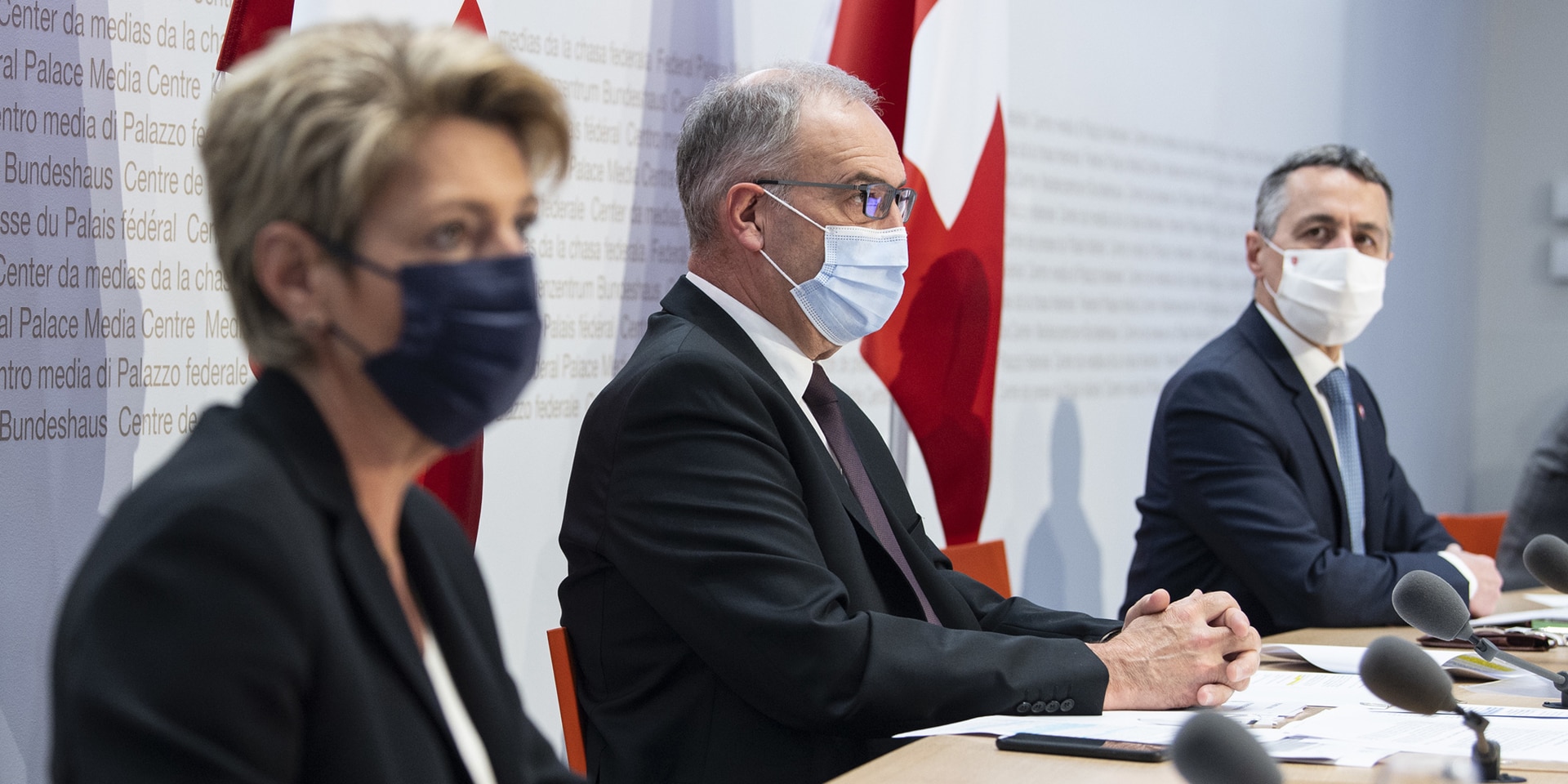Switzerland remains a committed partner to the EU even without the institutional agreement
On 26 May 2021 the Federal Council decided to stop negotiations on the institutional agreement with the EU. At a press conference following the Federal Council meeting, President of the Swiss Confederation Guy Parmelin and Federal Councillors Ignazio Cassis and Karin Keller-Sutter explained the reasons for this decision. Mr Cassis affirmed that Switzerland remains a reliable and committed partner to the EU even without the institutional agreement.

President of the Swiss Confederation Guy Parmelin, Federal Councillor Ignazio Cassis and Federal Councillor Karin Keller-Sutter explain to the press the reasoning behind the Federal Council's decision on the institutional agreement. © Keystone
FDFA publishes two assessments of alternatives for negotiations for Swiss-EU institutional agreement
17.12.2021
In the run-up to the Federal Council's decision on the Swiss-EU institutional agreement, the FDFA commissioned two external assessments on alternatives for the negotiation process. These assessments contributed to the Federal Administration's analyses, which were submitted to the Federal Council.
These assessments, drawn up by Nicolas Levrat of the University of Geneva and Michael Ambühl and Daniela Scherer of ETH Zurich, were made accessible to the members of the National Council's Foreign Policy Committee this week and are available on the FDFA’s website (see the list of documents).
Switzerland and the EU have made every effort to resolve the outstanding issues in the institutional agreement. On 26 May 2021, the Federal Council undertook an overall evaluation and concluded that it would have been impossible to resolve the substantive differences between Switzerland and the EU on key aspects of the agreement.
- Switzerland takes the view, for example, that rights of free movement apply to workers and their family members. For the EU, however, free movement rights are attached to the Citizens Rights Directive. It takes the view that free movement encompasses, for example, the right of permanent residence or social security entitlement for economically inactive persons. Switzerland wanted to exclude these aspects, which extend beyond free movement for workers, in the event the Citizens' Rights Directive were adopted. The EU was not prepared to do this.
- With regard to wage and worker protection, both Switzerland and the EU apply the principle of 'equal pay for equal work'. However, there was disagreement about how to ensure that the principle is respected. Switzerland therefore designed accompanying measures that were intended to apply notwithstanding any changes in EU law and the case law of the Court of Justice of the European Union. The EU rejected Switzerland's demands in this respect.
- A solution on state aid was floated – subject to the condition that solutions would be found to the other outstanding issues. Unfortunately, these issues could not be resolved.
Measures to mitigate adverse consequences
At the press conference, Mr Cassis reiterated that there were also potential drawbacks for Switzerland in not signing the agreement. The Federal Council has indicated in the past that the EU would be unwilling to enter into new market access agreements or update existing agreements in the absence of an institutional agreement. Negotiations on electricity, public health and food safety, for example, became deadlocked some time ago. The EU has also ceased to update some key agreements currently in effect. Mr Cassis referred, for example, to medical devices, which are governed by the Agreement on Mutual Recognition in relation to Conformity Assessment (MRA). The Federal Council has therefore initiated a range of measures to mitigate adverse consequences.
Reliable partner to the EU
Mr Cassis affirmed that Switzerland remains a reliable and committed partner to the EU even without the institutional agreement: "for the Federal Council it is clear that Switzerland and the EU will continue to work in close partnership in future." He also referred to the 100 or so agreements on which the bilateral approach to cooperation is based and the close trade relations between Switzerland and the EU. 1.4 million EU citizens live in Switzerland. In addition, about 340,000 cross-border commuters from the EU work in Switzerland. Last but not least, Switzerland and the EU share the same fundamental values and pursue common goals, for example in relation to climate and environmental protection, migration, promoting peace, security, human rights and combating poverty. Switzerland and the EU are also jointly committed to strengthening cooperation on health, regional development and digitalisation.
Documents
- Alternatives for negotiations: Assessment by Nicolas Levrat of the University of Geneva (PDF, 60 Pages, 12.0 MB, French)
- Alternatives for negotiations: Assessment by Michael Ambühl and Daniela Scherer of ETH ZurichExpert (PDF, 28 Pages, 1.6 MB, German)
- Letter from the Federal Council to the President of the European Commission, 26.05.2021 (Unofficial translation; original text in French prevails)
- Timeline of Swiss-EU relations since 2013
- Institutional agreement: outcome of talks between Switzerland and the EU on Citizens' Rights Directive (CRD), wage protection and state aid issues
- Mandat d’examen en vue d’éliminer de manière autonome des divergences entre l’ordre juridique suisse et le droit européen
- Report on the negotiations for an institutional agreement between Switzerland and the EU (in French, not available in English)
